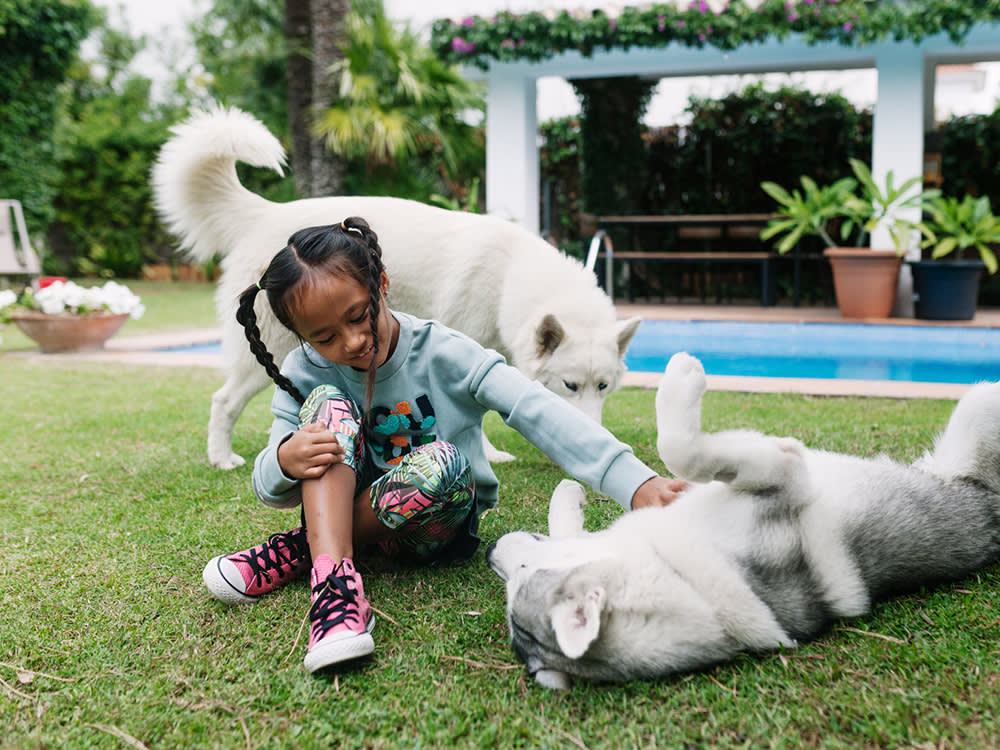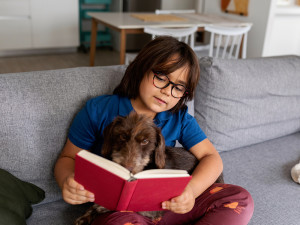Go Figure, Pets Are the Best Defense Against Kids’ Allergies
This one’s for you, human parents-to-be.

share article

Your pet wants you to read our newsletter. (Then give them a treat.)
If there’s one thing most people can agree on, it’s that allergies — whether due to pollen or pets — are no fun. And that’s unfortunate because allergies and asthma in kids are on the rise. So what’s a parent who just wants their kids to be happy and healthy to do? Get a pet!
Okay, it’s not quite that simple. However, growing evidence suggests that kids exposed to pets at a young age may have a reduced risk of allergies later in life. And that’s a big deal because, in the not-so-distant past, some well-intended parents kept their kids away from pets to protect them from future allergies. But it turns out that practice didn’t necessarily deliver the desired results. So, where does that leave us today? We chatted with Dr. Pamela Schreiner, professor and director of the Center to Study Human-Animal Relationships and Environments (CENSHARE), to find some answers.
On the surface, raising children in as clean a setting as possible sounds like a great idea. But in truth, pristine environments didn’t always yield the allergy-free kids parents hoped for. In fact, sometimes that effort had the opposite effect, and those kids were more likely to develop allergies. The reason relates to what’s known as the hygiene hypothesis. Dr. Schreiner explains. “The hygiene hypothesis states that lack of early exposure to infectious agents, certain microbiota, and parasites can increase susceptibility to future allergies and asthma by suppressing the natural development of the immune system.”
On the flip side, exposing kids to potential allergens when their immune system is still in training mode may help their bodies learn how to appropriately respond when they encounter the allergen again later in life. So in our pet example, exposing a young child who is susceptible to allergies to a dog or cat may reduce the risk of that child developing an allergy to that type of pet down the road. But the benefits of that exposure may be even more far-reaching.
Dr. Schreiner explains: “People with allergies to pet dander are also more likely to have asthma and allergies to pollen. So babies with a genetic susceptibility to allergies who have early exposure to pet allergens may also have a lower incidence of other conditions later in life.” A studyopens in a new tab published in 2002 backs up this statement. In it, researchers found that children exposed to two or more dogs or cats during the first year of their life had a reduced risk of sensitization to multiple allergens.
And according to Dr. Schreiner, the first year of life may be the critical window, as that is when the immune system is still developing. “If a child has a genetic predisposition to allergies and is exposed to an allergen after their immune system is already developed, that will lead to sensitization and allergies when the child is older.”
At this point, you may be tempted to conclude that raising babies with pets is a slam dunk when it comes to preventing allergies. And while we’d love to be able to say that with absolute certainty, the answer comes with some caveats. “There is good evidence that early exposure to pets can reduce allergies,” says Dr. Schreiner. “But it’s more complicated than that. People’s responses to allergens varies widely. And exposure to other allergens, such as dust, cockroaches, grass, and rodent droppings, can also influence the development of allergies.”
So we don’t yet know definitively that pets can provide future protection from allergies. But hey, “good evidence” is nothing to sneeze at.

Kate Sheofsky
Kate Sheofsky hails from San Francisco, where she developed a love of writing, Giants baseball, and houses she can’t afford. She currently lives in Portland, OR, and works as a freelance writer and content strategist. When not typing away on her laptop, she enjoys tooling around the city with her two rescue pups searching for tasty food and sunny patios.
Related articles
![]() opens in a new tab
opens in a new tabHow Pia Baroncini Prepared Her Dogs for Her New Baby
The creative multi-hyphenate and dog rescue advocate is mom to three big mushes and one tiny human.
![mom and daughter playing with puppy]() opens in a new tab
opens in a new tabHow to Introduce Your New Dog to Your Kids
They’ll always remember their first childhood pet — this intro is just the beginning.
![Boy reading a book on the sofa to his dog]() opens in a new tab
opens in a new tabWhat Happens When Kids Read Books With Dogs
Spoiler alert: it’s more than just cute.
![Man wearing pink headphones playing with dog on sofa with plants and a painting in the background]() opens in a new tab
opens in a new tabShould You Take an Adoptable Pet For a Test Drive?
Some animal rescues allow trial runs for interested adopters. Get the scoop on how foster-to-adopt programs work.





